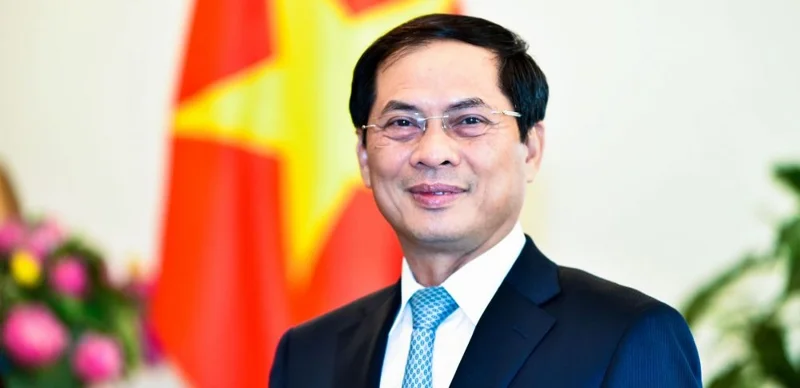Kazakhstan–Vietnam: The voice of developing countries in the global economic architecture
At the invitation of President Kassym-Jomart Tokayev, the General Secretary of the Central Committee of the Communist Party of Vietnam, Tô Lâm, is paying a state visit to Kazakhstan from May 5 to 7, 2025. In an interview with the Kazinform News Agency, Deputy Prime Minister and Minister of Foreign Affairs of Vietnam, Bui Thanh Son, discussed the state of Kazakhstan-Vietnam relations.

- Kazakhstan-Vietnam relations continue to expand across all areas of mutual interest. They have significantly intensified following the talks held during the official visit of President Kassym-Jomart Tokayev to Vietnam in 2023. The state visit of the General Secretary of the Central Committee of the Communist Party of Vietnam, Tô Lâm, to Kazakhstan will open a new chapter in these relations. In this context, what can be said about the current cooperation in the fields of investment and trade-economic relations, and in which areas should we strengthen our partnership?
- Despite the geographical distance, the peoples of Vietnam and Kazakhstan have consistently nurtured warm, close-knit relations. In recent years, our traditional friendship and multifaceted cooperation have evolved into a closer and more effective partnership, yielding positive outcomes, especially in the areas of economics, trade, and investment.
Kazakhstan stands as Vietnam’s second-largest trading partner in the Eurasian Economic Union (EAEU). In 2024, bilateral trade exceeded USD 800 million, reflecting a remarkable doubling of the figure from 2023. In the first quarter of 2025 alone, the bilateral trade turnover reached USD 146.3 million, marking an 18.4% increase year-on-year.
An Intergovernmental Committee for economic, trade, scientific, and technical cooperation has been established, holding 11 meetings so far. The implementation of the Joint Action Plan for 2023–2025, with a perspective extending to 2030, is underway. Additionally, the establishment of a Vietnamese Trade Representative Office in Kazakhstan and a Joint Vietnamese-Kazakhstani Business Council is progressing.
While the number of investment projects in each other's territory remains modest, their upward trajectory in recent years signals a growing interest from Vietnamese enterprises in the Kazakh market. Cooperation in tourism and people-to-people exchanges have also expanded, with 21 direct flights operating weekly. The influx of Kazakh tourists to Vietnam is growing steadily, reaching approximately 150,000 arrivals in 2024.
Despite the achievements, the potential for cooperation remains significant. It is essential to focus on developing transportation connectivity, particularly railway links. The export goods of the two countries have little competition with each other, which opens up opportunities to increase Vietnamese exports to Kazakhstan and, through it, to other countries via the transnational corridors East-West and North-South.
Furthermore, both sides possess advantages that can be leveraged to further enhance cooperation in finance, energy, oil and gas, mining, education and training, science and technology, as well as promising new fields such as digital technology, clean energy, advanced materials, and artificial intelligence.
I am confident that the state visit of General Secretary Tô Lâm to Kazakhstan will open new strategic opportunities for comprehensive cooperation, further strengthening the traditional friendship between our countries.
- What opportunities and challenges do Vietnam and Kazakhstan face in advancing sustainable development and responding to climate change?
- Cooperation on sustainable development and climate change response is a relatively new area in Vietnam - Kazakhstan relations, but one in which both countries have shown strong interest. Notably, this topic was included for the first time in the Joint Declaration on the Establishment of a Strategic Partnership between Vietnam and Kazakhstan during this visit.
In the face of increasing non-traditional security challenges, including climate change, Vietnam and Kazakhstan have the opportunity to shape a new, broader, and more substantive framework for cooperation aimed at long-term sustainable development.
Our two countries enjoy a strong political foundation and share commitments to global goals, including the Paris Agreement on Climate Change. Vietnam has strengths in disaster response and sustainable agriculture practices while Kazakhstan has valuable expertise in water resource management and renewable energy development.
However, differences in natural conditions, and varying levels of readiness in terms of finance, technology, institutions, and environmental management present challenges. It is essential to translate our shared commitment into concrete, action-oriented programs and projects.
With a strategic vision, Vietnam seeks to work closely with Kazakhstan to develop an integrated framework for cooperation, spanning from scientific research, green technology transfer, circular economy development to the training of high-quality human resources in environmental issues and climate change. At the same time, we hope that the two countries will jointly advance common initiatives at international forums, thereby amplifying the voice of developing nations in shaping a more inclusive and sustainable global development architecture in the future.
- Vietnam and Kazakhstan share much in terms of history and culture. Our countries have gone through many hardships and challenges in the struggle for national independence. What historical lessons form the basis of Vietnam's current foreign policy?
- The outstanding achievements in Vietnam’s struggle for independence, national reunification, and the current process of renewal all bear the hallmark and significant contributions of foreign affairs. The valuable historical lessons accumulated over the past 80 years remain entirely relevant and continue to illuminate the path for Vietnam’s diplomacy in the new era, an era of national advancement.
First is the lesson of ensuring the highest national interests. Vietnam’s diplomacy has always imbued President Ho Chi Minh’s teaching: “Always serve the nation's interests.” Today, the national interest remains the compass guiding all actions, the most fundamental basis for determining Vietnam’s foreign policy and orientation, on the principles of equality, cooperation, mutual benefit, and in accordance with the United Nations Charter and international law.
Second is the lesson of combining national strength with the strength of the times. In the current period, diplomacy continues to play a pioneering role in mobilizing favorable external conditions and resources, such as the trends of peace, cooperation, and development, the advancements of the Fourth Industrial Revolution, and emerging development trends such as digital transformation and green transition, to serve national development.
The third lesson is close coordination between foreign policy, defense, security, and other sectors, both in policy development and implementation. Today, foreign policy, defense, security, and other areas are considered key components in ensuring independence, sovereignty, and territorial integrity, as well as in creating a peaceful, stable, and favorable international environment.
The fourth lesson is active integration with the outside world. This means comprehensive, broad, and effective international integration, which serves as a driving force for development and a collective goal for the entire political system and the people.
These invaluable historical lessons continue to shape Vietnam’s foreign policy in the new era, adapting to the evolving international context and helping Vietnam further affirm and elevate its position in the international arena.
- The prolonged tensions between the United States and China pose challenges to security and stability in the Asia-Pacific region. Meanwhile, Vietnam is increasingly recognized by the international community as a country playing a particularly important role in the regional security architecture. Could you share the principles and policy adjustments that enable Vietnam to maintain a balance among major power centers amid the current complex context?
- Vietnam’s consistent and overarching foreign policy is firmly anchored in the principles of independence, self-reliance, diversification and multilateralization of external relations. Vietnam strives to be a friend, a reliable partner, and a responsible member of the international community, actively and proactively pursuing comprehensive and extensive international integration.
The fundamental principle and motto guiding Vietnam’s foreign affairs is to safeguard the highest national interests in accordance with the UN Charter and international law, to resolutely and persistently defend independence, sovereignty, unity, and territorial integrity, and to apply the principle of “being firm in policy yet flexible in execution” to maintain peace and stability.
At the same time, Vietnam adheres to the “Four No’s” defense policy: no military alliances, no alignment with one country against another, no foreign military bases or use of Vietnamese territory to oppose other countries, and no use or threat of force in international relations.
Based on this, despite international and regional fluctuations, Vietnam pursues an open and balanced foreign policy. The country has established diplomatic relations with 194 states, is an active participant in over 70 international organizations and forums, and has 34 strategic and comprehensive partnerships, including with all permanent and non-permanent members of the UN Security Council. Vietnam also actively contributes to addressing global and regional issues and promotes the central role of ASEAN in the regional security architecture.
Earlier, Kazinform News Agency reported on Vietnam’s Communist Party General Secretary Tô Lâm state visit to Kazakhstan.

